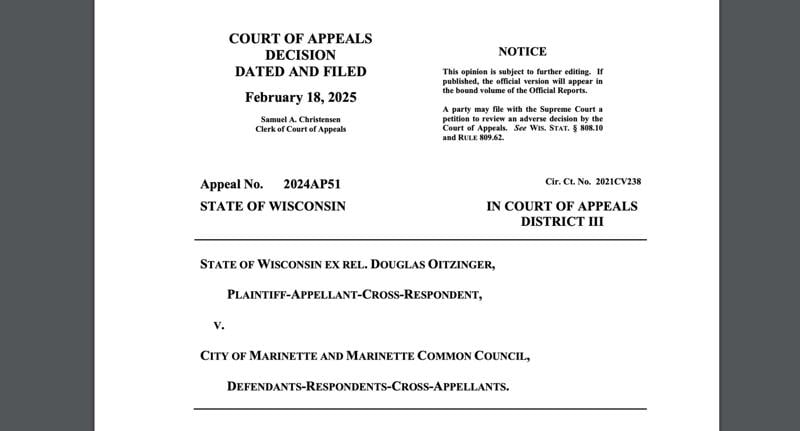The Wisconsin Court of Appeals ruled that Marinette violated Wisconsin’s open meetings law when it held a pair of closed sessions to discuss a fully negotiated settlement with Tyco over PFAS contamination and discussed an engineering report on repairing the contaminated water supply.
The lawsuit was brought by Marinette alderperson Douglas Oitzinger by the Wisconsin Tranparency Project. Oitzinger was awarded attorney’s fees and court costs in the settlement.
The lawsuit alleged that the city council went into closed session on Oct. 6, 2020, without informing even the council on the topic and simply saying it was for “competitive or bargaining reasons.”
The discussion, however, was not about the narrow allowance for developing negotiating strategies for a settlement but instead was about discussing the actual fully negotiated settlement between Tyco and Marinette’s mayor and utilities operations manager.
That discussion included an explanation on how the sludge had been contaminated with PFAS, why drying it out would save shipping costs, how the drying equipment worked and the terms of the agreement.
Tyco had flushed its firefighting foam down Marinette’s sanitary sewers into the wastewater treatment plant for a “significant period of time” at its Fire Technology Center in Marinette, an undisputed fact according to the court’s ruling.
It also allowed the foam to seep into the soil surrounding the facility and, in 2017, it became clear that PFAS was in the groundwater. The biosolids from the wastewater treatment plant was then spread on agricultural fields as manure and, in September 2018, the Wisconsin Department of Natural Resources requested that Marinette stop spreading the biosolids.
At that point, the biosolids were instead kept in a holding tank with Marinette left to determine how to safely dispose of them.
Tyco agreed to pay to partially dehydrate the biosolids that Marinette was storing and ship them to a landfill in Oregon along with $75,000 toward “fees related to professional services rendered by attorneys and an environmental consultant.”
That agreement was fully approved by the council on Nov. 3, 2020.
At a follow-up meeting on Oct. 7, 2020, the council again went into closed session to hear recommendations from engineering firm Ruekert Mielke, hired by Tyco, on handling the contaminated sludge and groundwater.
The discussion included eight solutions for providing clean drinking water to Peshtigo residents whose well water had PFAS contamination. The Ruekert Mielke report was not made public or even available to council members until the open meetings lawsuit was filed.
The court ruled that the public should have hear the recommendations and “the citizens who were now dealing with serious concerns about PFAS in their water supply and the municipality’s costs to clean them up at taxpayer cost had a right to know this information.”
“This has been a very long and stressful process but in the end, the public’s right to know and open government won out,” Oitzinger said in a statement. “The court rejected calling anything and everything a negotiation, which the city argued allowed them to hold all deliberations in secret. This could have been settled long ago if only there had been a willingness to acknowledge that city administration could have done better. Democracy is a little bit stronger today in Wisconsin because of this court decision.”
The ruling has been recommended for publication and will therefore become binding and require all government agencies statewide to explain the specific reason for a closed session before the body can go into closed session.
That transparency would then allow public board members to make informed decisions before voting to go into closed session. Those board members can be liable for $300 in fines for violating open meetings law.
“This could have been settled long ago if only there had been a willingness to acknowledge that city administration could have done better,” Oitzinger said. “Democracy is a little bit stronger today in Wisconsin because of this court decision.”







